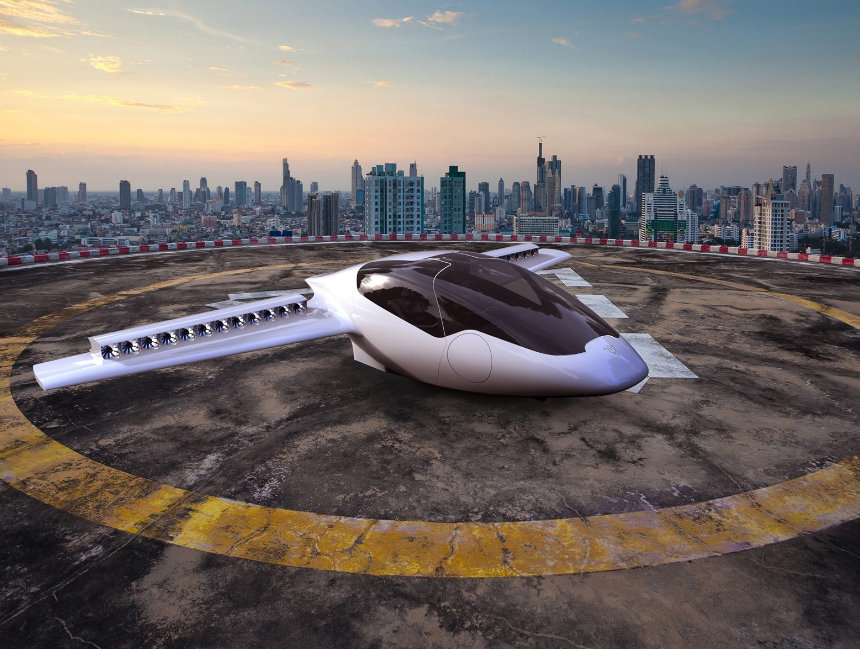 EMERGING TECH
EMERGING TECH
 EMERGING TECH
EMERGING TECH
 EMERGING TECH
EMERGING TECH
German aviation startup Lilium GmbH has taken an important step forward in its plans to deliver a five-seater airborne taxi called the Lilium Jet, after closing on a $90 million Series B funding round.
The company said on Tuesday it was backed by investors including the royal family of Liechtenstein’s investment fund, China’s Tencent Corp. and Evan Williams, one of the co-founders of Twitter Inc., through his Obvious Ventures capital fund. The round brings its total funding to over $100 million.
With the new funding, Lilium said, it wants to step up the development of its aircraft and expand its team to more than 70 people.
“This is the next stage in our rapid evolution from an idea to the production of a commercially successful aircraft that will revolutionize the way we travel in and around the world’s cities,” said Lilium co-founder and Chief Executive Officer Daniel Wiegand. “It makes Lilium one of the best funded electric aircraft projects in the world.”
Lilium’s prototype, two-seater vertical takeoff and landing vehicle, completed its maiden, remote-controlled voyage last April, showing off the aircraft’s vertical landing capabilities at the same time, similar to those of an F-35 jet fighter.
The aircraft’s design is quite futuristic and certainly unique. For one thing, it’s powered by 36 ducted electric fans rather than jet fuel. The plane also lacks dedicated control surfaces such as ailerons or elevators, and there is no fin, which is used as a vertical stabilizer on traditional aircraft. Lilium reckons the fin is not necessary as “differential thrust from the engines in cruise flight” means that they can compensate for any instability.
The company said its final, completed jet will be able to carry five passengers in total at speeds of up to 300 km/h on a single electrical charge. Lilium is hoping to carry out its first manned flight by 2019, before launching a series of commercialized aircraft by 2025.
The idea is to provide a service that’s somewhat similar to Uber Technologies Inc. or Lyft Inc., only its taxis would be airborne and therefore much more capable of beating the traffic. However, one major difference is that its air taxis would need to be reserved ahead of time, and customers would need to make their way to the nearest landing pad to hop on board.
Lilium said that besides being emission-free and reducing travel times, its aircraft may also have a positive impact on real estate markets. The thinking is that because living close to work will no longer be so important, apartments in the city might become more affordable.
Lilium’s plans might seem a bit improbable at this early stage, but surprisingly it isn’t the only company looking into the concept of electric-powered aircraft. One potential rival could be a startup called Kitty Hawk Corp., which is backed by Google LLC co-founder Larry Page. Kitty Hawk hasn’t said anything about a taxi service at this point, but it did reveal its own prototype craft called the Kitty Hawk Flyer in April. Kitty Hawk’s designs also seem to be coming along much faster, as the company said it plans to make the aircraft available by the end of this year.
Support our mission to keep content open and free by engaging with theCUBE community. Join theCUBE’s Alumni Trust Network, where technology leaders connect, share intelligence and create opportunities.
Founded by tech visionaries John Furrier and Dave Vellante, SiliconANGLE Media has built a dynamic ecosystem of industry-leading digital media brands that reach 15+ million elite tech professionals. Our new proprietary theCUBE AI Video Cloud is breaking ground in audience interaction, leveraging theCUBEai.com neural network to help technology companies make data-driven decisions and stay at the forefront of industry conversations.